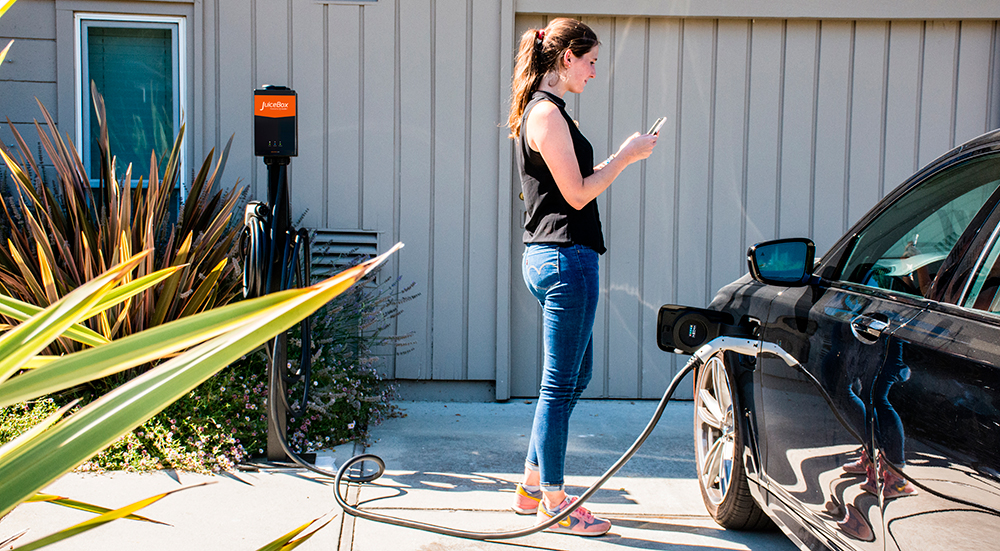What to Consider When Buying and Installing a Residential Electric Vehicle Charger

Smart electric vehicle chargers are on the rise to meet the needs of the growing demand for renewable electricity to power the world’s electric vehicles. As EV owners and drivers support the ambitious sustainability goals across North America, it is essential that residential electric vehicle chargers are provided to economically and sustainably update the energy and transportation systems.
What is a Residential Charging Station?
A home charging station is also known as “electric vehicle supply equipment” (EVSE). It is a machine that supplies electric energy for the recharging of plug-in electric vehicles. They can provide electrical conversion, monitoring, or safety functionality and can provide a range of heavy-duty or special connectors that conform to a variety of standards.
Residential EV’s is used when an owner plugs into a standard receptacle, recharging the vehicle overnight. Home charging stations usually have no user authentication, no separate metering, but may require wiring a dedicated circuit for faster charging.
Costs of Charging With a Residential EV Charger
The cost of fully charging an all-electric vehicle with a 100-mile range and a depleted battery is equal to the cost of operating an average central air conditioner for six hours. Plug-in hybrid EV’s that have smaller batteries can even cost less.
In general, the fuel costs for EV’s are lower than for conventional vehicles. For example, General Motors estimated the annual energy use of a Chevy Volt as 2,520 kWh, which is less than required for a typical water heater.
In fact, when you charge your EV at night and your utility offers off-peak rates, the cost of charging your EV may be even lower.
Essential Steps in Choosing a Home Charging Station
There are many considerations in determining the right home charging station for your vehicle. Here are the essential steps to take so you can reach that goal:
- Determine the charging station capacity of your vehicle first. Consider this: if you do not drive much or the electric range of your vehicle is less than 20 miles, a Level 2 charging station is not worth the cost. Try using the factory Level 1 charger first. Remember that Level 2 chargers always charge quicker.
- If you will DIY the electrical work of your home charging station, you will need the following information:
- Model of the plug-in vehicle you want to charge.
- Location of the closest electrical panel to your parking area.
- Your vehicle’s electric range or the longest distance you expect to drive between regular charges.
- Follow installation guidelines of your purchased charging station.
- Otherwise, if you will hire an electrician, purchase a charging station and ask for three quotes from different electricians to install a “240 volts 50 amp” circuit to your parking space and install your charging station. You will be better off with this recommended circuit installation.
- Let your electrician install the charging station and adjust the charging station’s maximum current to not overload the circuit if you chose the cheaper electrical circuit.
- Check if the installation works well by charging your vehicle.
Top Picks for a Residential EV Charger
Here’s a list from AutoGuide to help you decide on a residential electric vehicle charger that you can use. Essential features like durability, a long charging cord, charging speed, cost, and outdoor rate (durability when exposed to sun, wind, and water) were considered in making this list:
- JuiceBoxPro 40 with Juice Net
- Siemens VersiCharge Home Charger
- Bosch Level 2 EV Charger
- ChargePoint Home Flex WiFi Enabled EV Charger
- Megear Level 2 EV Charger
- AmazonBasics Level 2 EV Charging Station
- MUSTART Level 2 Portable EV Charger
- ClipperCreek HCS-40 EV Charging Station
- Morec Level 2 EV Charger
- EvoCharge Level 2 EV Charger
Choose the Right Residential EV Charger
Getting the right residential EV charger can save you cash in the long run and help you avoid wasted hours waiting to get back on the road when your car battery is depleted. Get a high-speed residential charging station installed based on your real needs.
There are electrical vehicles nowadays that don’t use more of the battery than can be replenished overnight with a basic 120V connection. Customize your electric-vehicle charging habits to your vehicle’s everyday needs to get the most cost-effective benefits from your residential electric vehicle charger.



/cdn.vox-cdn.com/uploads/chorus_asset/file/19624303/edited_LRB_110812_6348_2.0__1_.jpg)



